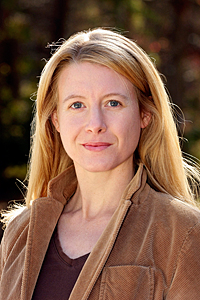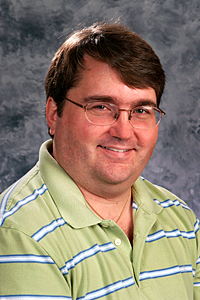Fellow takes on the role of writer and research support specialist
By Sonika Patial

During her tenure at NIEHS, King sought out opportunities to hone her skills for communicating science to a variety of audiences. (Photo courtesy of Steve McCaw)

Like many of his colleagues at NIEHS, Petrovich takes his responsibilities as a mentor seriously, by supporting trainee involvement in career development activities. (Photo courtesy of Steve McCaw)
Heather King, Ph.D., a former fellow in the Laboratory of Structural Biology (LSB) at NIEHS, made a move in June to start her new career as an environmental writer. King will be working primarily on science and research program support projects involving MDB, Inc. and the NIEHS Division of Extramural Research and Training.
At NIEHS, King worked on a collaborative project between the Protein Expression Core Facility in LSB headed by Robert Petrovich, Ph.D., and Trevor Archer, Ph.D., lead researcher and chief of the Laboratory of Molecular Carcinogenesis (LMC). In Archer’s group, King investigated the human SWI/SNF chromatin remodeling complex, by preparing protein and protein fragments from this complex and using them for antibody production, biochemical assays, and crystallization trails.
When asked about her job search, King said that beginning in her fourth year, she occasionally applied for jobs that seemed to be a good fit for her science skills, mostly related to protein biochemistry. “For these jobs, I had the basic bench skills they were looking for, but nothing to distinguish me or to indicate that I was an especially good fit,” she said.
However, she soon realized that the skills that seem more everyday, such as writing, critical reading, and editing, were some of her strongest and most marketable. For King, the hardest part was learning to not focus too much on what made her similar to other postdocs, but to appreciate the attributes that distinguished her. And, in King’s case, these included a general love of language as well as the experience she had in the four years between college and graduate school, which were an important factor in her success.
Effective writing skills developed over time
King started writing during her first job, when she worked at a consulting engineering company on a remediation contract for the U.S. Army. Her work there involved a tremendous amount of writing and document preparation, in addition to analyzing environmental problems and new remediation technologies.
During her tenure as a postdoctoral fellow at NIEHS, she took advantage of opportunities in her lab to help out with any editing or writing tasks, which turned out to be a good practice in general. King was also a member of the NIH Fellows Editorial Board, which provides fellows an opportunity to take part in a formal editing forum and to interact with others who are interested in editing and writing. In addition, she attended American Scientist pizza lunch seminars at nearby Sigma Xi headquarters. These monthly seminars are designed for people interested in science communication and offer many opportunities for networking.
“My neighbor, who works in science communications, invited me to go” King said. “In fact, I found out about MDB, Inc., from a former NIEHS fellow, who now works in DERT, while we were talking at one of the American Scientist pizza lunches at Sigma Xi.”
MDB (http://www.michaeldbaker.com/) is a privately owned strategic consulting firm that provides contract writing and several other support services for NIEHS extramural research groups, as well as other government agencies such as the U.S. Environmental Protection Agency and the National Science Foundation.
(Sonika Patial, D.V.M., Ph.D., is a fellow in the Laboratory of Signal Transduction at NIEHS.)
The importance of good mentoring
King credits Petrovich with helping to motivate her to begin searching for a job. “My supervisor, Bob, has acted as a second mentor for many postdocs, and has experience in industry, as well as government and academic jobs, so he knows how tough it can be to find the right job at the last minute,” she said. “He encouraged me to start thinking about my post-postdoc life early on.”
According to Petrovich, one of King’s main strengths was her ability to see the bigger picture on the project, not just to focus on what’s in front of her, but also to explore how the different projects within the lab interact. As a bonus, she also enjoyed writing. “We talked a great deal about what she wanted to do next, and when the position at MDB came up, fortune favored the prepared and I lost a good postdoc,” he added with a laugh.
King also collaborated extensively with Archer. “Trevor was also very helpful in giving me opportunities to write, review, and edit,” she said. King published a review article with Archer and biologist Kevin Trotter on glucocorticoid signaling and chromatin remodeling, which helped her when she was interviewing for the position. “Review writing shows a skill set that's important for any science writer or communicator — reading, analyzing, and writing about scientific literature,” she added.
“Writing for the eFactor and working with Eddy Ball, Ph.D., the editor of the NIEHS newsletter, was also a great experience for me. “MDB works with Eddy on newsletter stories, and he was able to put in a good word for me,” King added.
"Educating the next generation ..." - previous story ![]()
![]() next story - "NTP fellow wins 1st ..."
next story - "NTP fellow wins 1st ..."
August 2012 Cover Page


